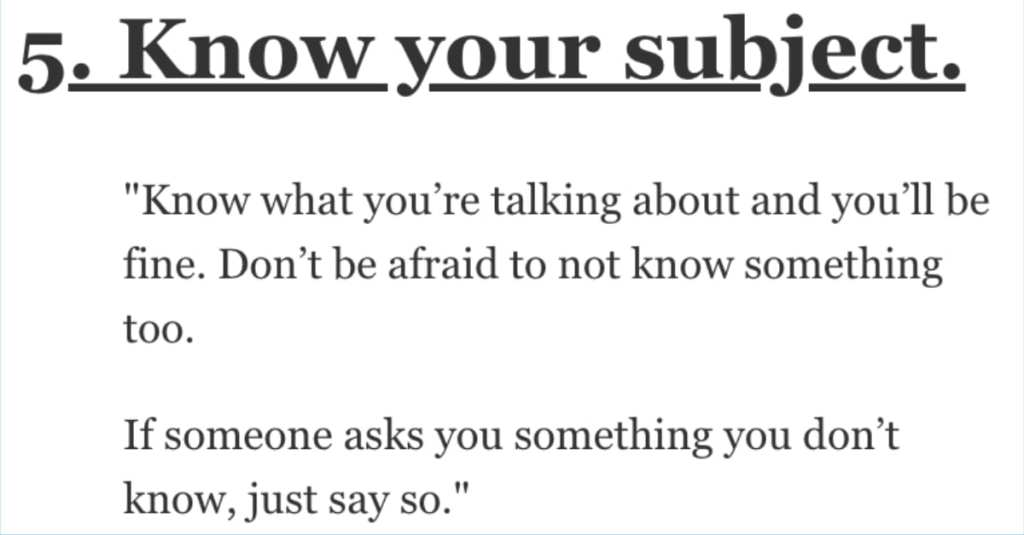Trending Now
I’ve gotten a teeny tiny bit better, but I can safely say that public speaking scares the absolute s**t out of me.
Do you feel the same way as me?
If so, you’re gonna want to pay attention to the responses below from folks on AskReddit.
1. Not nervous anymore.
“I was constantly nervous in any speaking situation. It didn’t matter if it was just an informal presentation to my research group or a big talk at a conference. I stuttered and struggled through every talk.
Over the course of a few years, I did public lectures to hundreds of people, I ran a D&D game, and ended up in a corporate job where, at one point, I found myself giving a talk every day for a month.
Now, I’m completely confident in any public speaking situation. I’ll talk about basically anything in front of any group willing to listen.
I totally sympathize with anyone who finds this advice terrifying but you can’t do better than just getting experience. Find opportunities to talk in a formal context, pick small groups or topics you feel really confident in but struggle through the embarrassment until you don’t care anymore.”
2. Practice makes perfect.
“It’s another skill.
Some people have natural talent and some people have to work at it.
The more you do it, the better you are at it. Simple.”
3. Nobody cares.
“Honestly just remembering that most likely, no one is paying attention anyway – especially if it’s school.
Literally nobody cares about your presentation.”
4. Fake it til you make it.
“I used to get SUPER nervous before any sort of public speaking event. Shaky hands, sweating, nausea- the whole 9 yards.
Eventually I landed a job as a corporate trainer. I was desperate for a job and $ so I just HAD to get up in a room of 30+ people every day and present the training material and answer questions.
Honestly I just pretended I didn’t care and faked it til I made it. Now, it ACTUALLY doesn’t bother me to speak in front of a group.
If this is a challenge that you are facing, maybe look into local public speaking groups such as Toastmasters.”
5. Know your subject.
“Know what you’re talking about and you’ll be fine.
Don’t be afraid to not know something too.
If someone asks you something you don’t know, just say so.”
6. Don’t care.
“Pretending you don’t care.
Steve Kerr the basketball coach recommends a book called The Inner Game of Tennis. Its theory is that your mind applies brakes that impede your performance (physical or other). If you pretend to be someone that is really good at a task/skill, your mind is less likely to apply those brakes. I’ve applied this to public speaking as well.
Try to pretend you’re someone comfortable speaking in front of others (I like to pretend I’m the Rock – focused and having energy, just not doing the wrestling theatrics).”
7. No one will remember.
“I don’t remember the people that bombed presentations because those aren’t formative memories.
No matter how much I bomb this presentation, no one will remember in a month, especially since they are stressed about their own presentation.”
8. Interesting approach.
“Don’t write a word for word speech. Develop your presentation in the form of questions that you can answer.
That way, when you get off of your plan, or have a question pop up that you didn’t explicitly plan for, you’re already in the mindset of solving a problem rather than reciting a speech.
It allows you to pivot and improvise much more effectively.”
9. It’s important!
“Know what you have to say is important. Tell yourself that you know what you are doing, and that other people need to hear what you have to say.
I’ve attended several research conferences, I notice the boomer aged presenters just DGAF and read directly from cards without looking up once.
If it helps, it doesn’t really matter if you are a subject matter expert with several dozen peer reviewed papers or a student, I think most people get nervous speaking in front of crowds, just remind yourself that it’s okay.”
10. Recognize it.
“It can help if you recognize those physical symptoms (tight chest, sweaty hands, or whatever it is for you) not as something is wrong, but rather your body preparing you for something important.
Your stress response isn’t as scary if you know it’s there to help you be a bada** if something scary shows up.”
11. You got this!
“I remind myself that everyone in the audience is rooting for me. Nobody wants me to bomb- they’re all on my side.
The worst that’ll happen is that people won’t be paying attention, and people who aren’t paying attention are easy to talk at without getting stressed out.”
12. Great practice.
“I was in Toastmasters for several years. It definitely helped me feel more comfortable standing up in front of people and talking.
I still don’t like it, but my body doesn’t completely physically betray me anymore (shaky hands, fast talking, filler words, weird hand movements, sweating, just looking extremely stressed, staring at notes) I mostly don’t have any of those problems anymore.
It was all just practicing being in front of people and getting used to it. I think it’s the best way to get better at public speaking.”
Do you have any tips about public speaking?
If so, tell us about them in the comments.
Thanks a lot!






